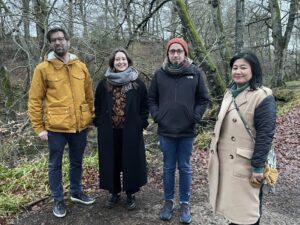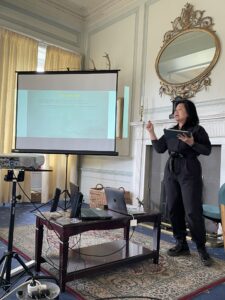Life on the Edge: Ecologies, Emptiness, Endings, Extremes
Organizers: Dr Daniel M. Knight (University of St Andrews) and Dr Dace Dzenovska (Oxford University)
Held at The Burn, Glenesk, Scotland
The Edge has long been used in environmentalism, geo-politics, and existentialist philosophy as a trope to elucidate a world in transition where one order (social, political, economic, ethical) is transcended by another. The edge can take many forms – literal and metaphorical –, holding in tension endings and beginnings, shifting hierarchies and ideological edicts, befores and afters, humans and natures, class and racial divides. One may ponder, for instance, planetary change where there is a shifting of epochs and periodisation. The Anthropocene represents a new archive for human activity, a line in the rockface accessible in the deep future to tell the story of the deep past. Similarly, the encroaching climate catastrophe tells us of the drastic and rapid need to change basic human behaviours, a context where moralities of environmental consciousness, multi-speciesism, and industrialisation clash head-on in a battle for the very existence of the planet. As sea-levels rise and land gives way to water, maritime politics take central stage. Calls for global coastal governance foreground emerging commodity chains that physically alter the lines of interaction at the edges of human habitation. In the Amazon and Indonesia, the literal edge can be identified on cartographies of deforestation, the destruction of habitats and species observable from orbiting satellites that provide a different perspective on the nature-culture divide. Off-planetary and deep-sea exploration represent the extreme ‘final frontiers’ of life as we know it, where eco-assemblages continue to rewrite scientific knowledge and challenge moral philosophies. The scale of these edges is global, epochal, big.
At an intimate quotidian level, the edge may index the perilous existence of refugees, residing in limbo while seeking a new home, or of minorities struck by policy changes that leave promised futures in tatters. To stay or to go (again)? Concrete edges form as dramatic rupture becomes chronic condition, where sharp geo-political divides become marked by bureaucratic, industrial, class, racial, and community relations. Here the anthropology of time and event is at the frontline of critiques of everyday orientations to the future, often indexed by stuckedness, lost trajectories, and retreating thresholds of Becoming. In the proverbial sense, people balance on the ‘cliff-edge’, clinging to past lives, promises, memories, while feeling the push to take the plunge over the horizon into the unknown, to create new history. The vertiginous edge, a place of conflict with Self and Society, provokes nausea, dizziness, the sense of out with the old and in with the something else.
As articulated here, the edge is a discursive figure to think about the current historical moment. As such, it bears family resemblance to other concepts, ethnographic and philosophical, that attempt to make sense of the present in an analytically and politically generative way. In particular, it works off and builds upon the concept of emptiness which denotes a space between the old world that has ended and the new world that is yet to be seen and that might not actually actualise. The aim here is to pluralise the conceptual terrain – a task that corresponds to the condition of the world these concepts strive to understand.
We invite contributors to engage with the creative destruction of endings and new beginnings, symbiotic assemblages at the edges of scientific, ecological, and social knowledge, and the transitional timespace characterised by emptiness and absence. Participants may wish to discuss emerging industries, identity politics and spatial relations, or the morality of transition zones, edges, and endings. Edges invariably engender a gordian knot of sensorial and affective orientations, of imaginations, institutionalisations, politicisations, entrapments, and freedoms. But to what extent is Life on the Edge, social ecologies of transitions and endings, simply a preoccupation of Western science and philosophy?
This conference is jointly funded by CCS through the School of philosophical, Anthropological and Film Studies, The Ladislav Holy Memorial Trust, and the European Research Council ‘Emptiness’ project.



